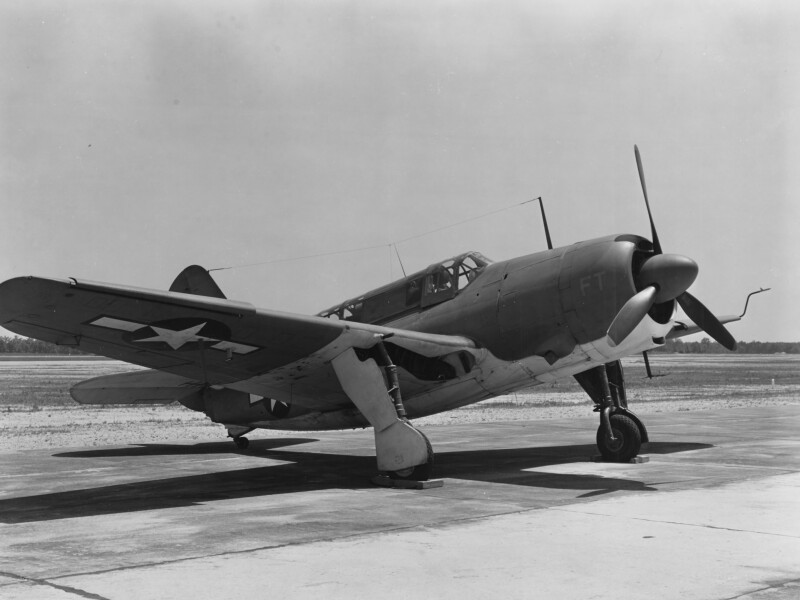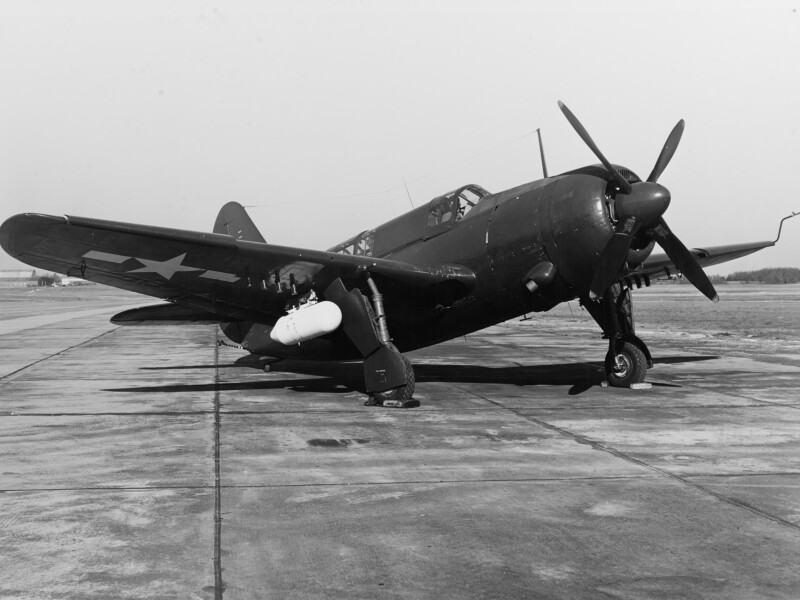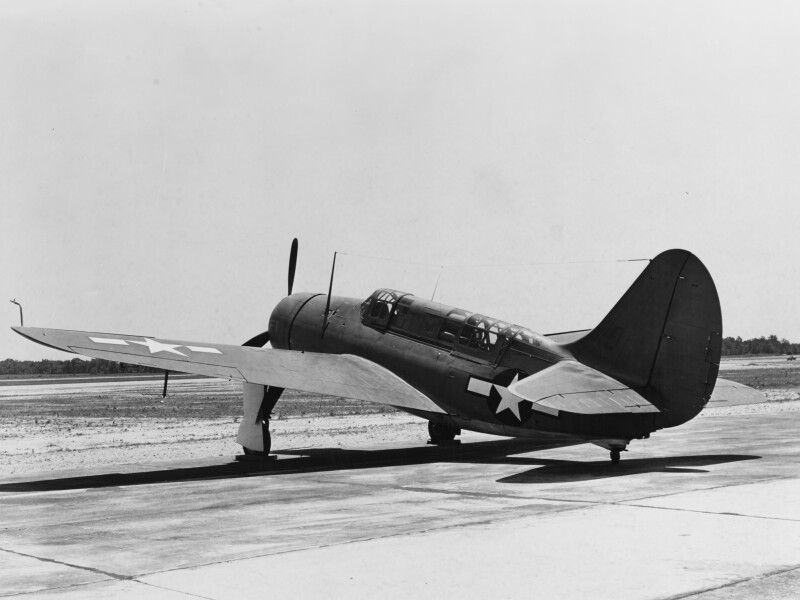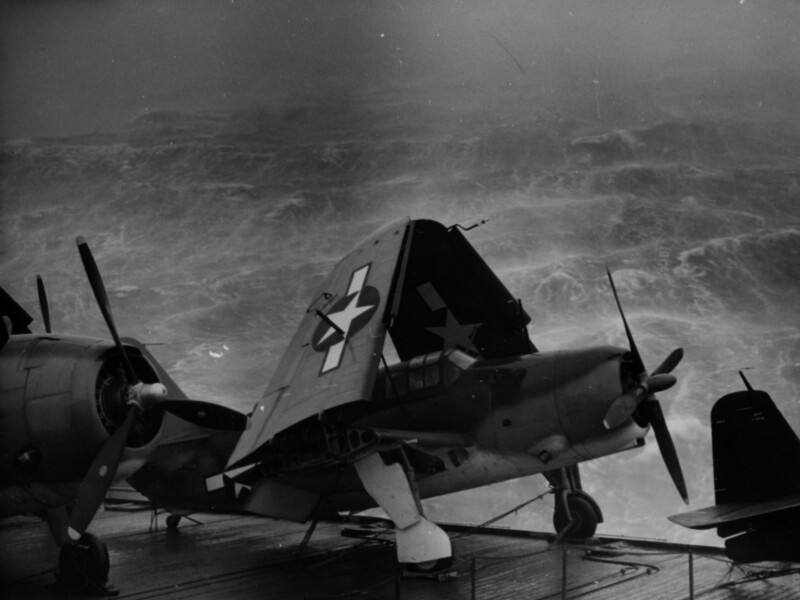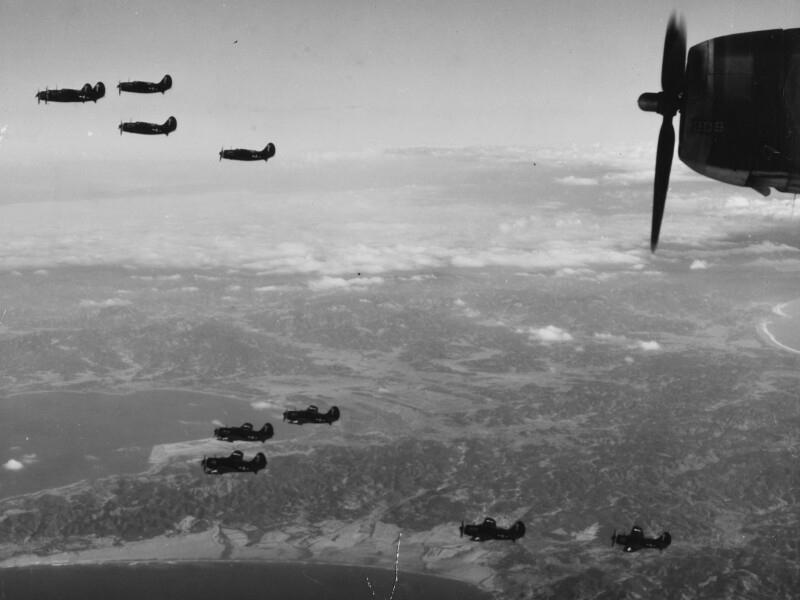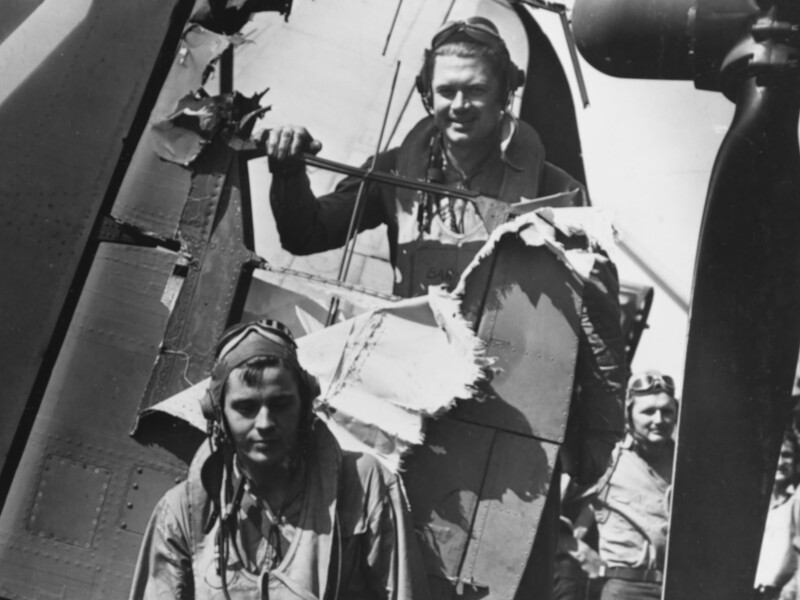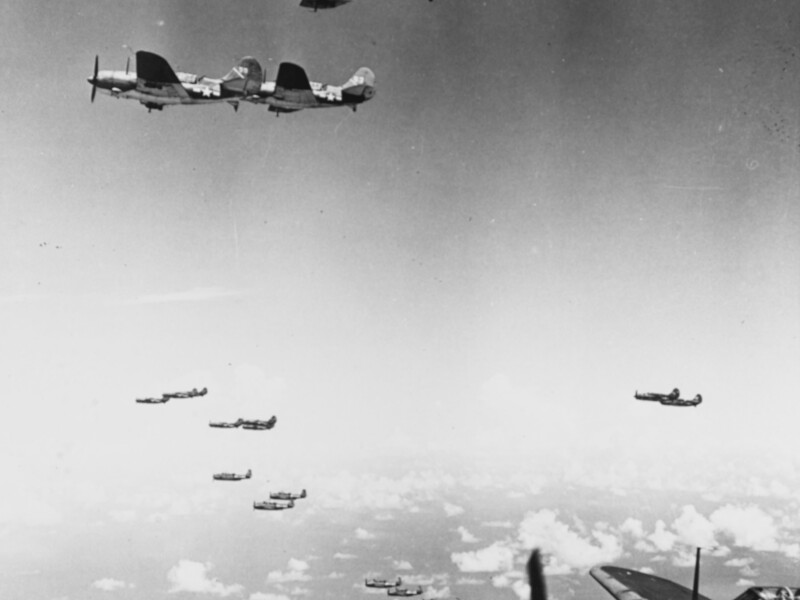-
Library
- Photos
- Documents
-
Geography
- Airfields
- Areas
-
Aviation
- Aircraft
- Engines
-
Weapons
- Guns
- Rockets
- Torpedoes
-
Avionics
- Radio
- Radar
- IFF
- Radar Detectors
- Jammers
- Navigation Devices
-
Unit Database
- Allied Units
- Axis Units
-
Pilot Database
- Pilots
- Victory Claims
- Torpedo Attacks
Curtiss SB2C Images
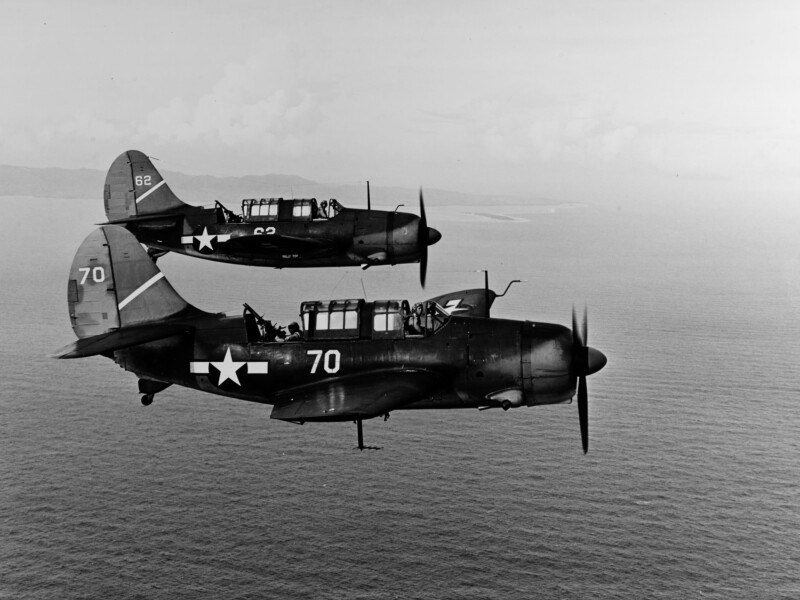
Two planes in flight. Note: two 20mm guns in wings; two 30mm guns in aft cockpit; white bar on fin indicates the planes are from USS YORKTOWN (CV-10); rake-like antenna beneath wing is ASB search radar.
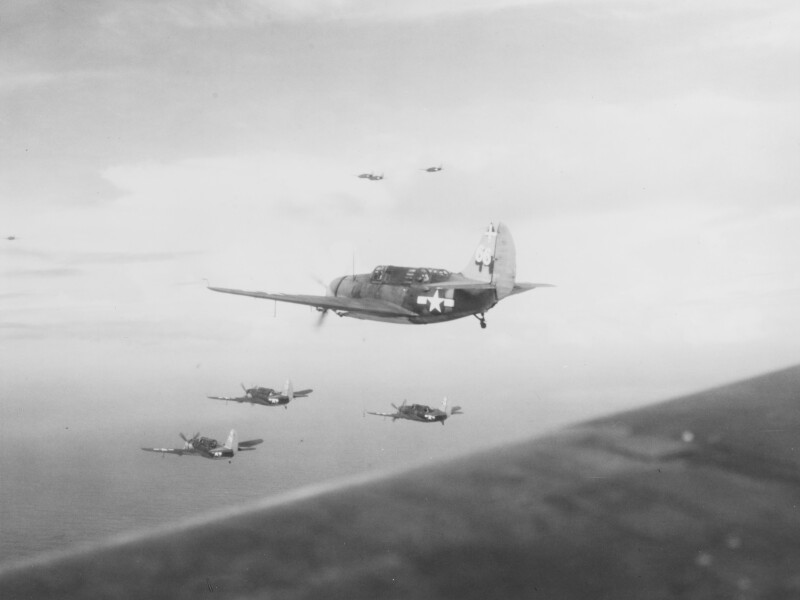
CURTISS SB2C-3 Bombers of VB-18 on patrol over the Philippine Sea, 15 November 1944. They are from USS INTREPID (CV-11). Note crudely repainted markings on tails.
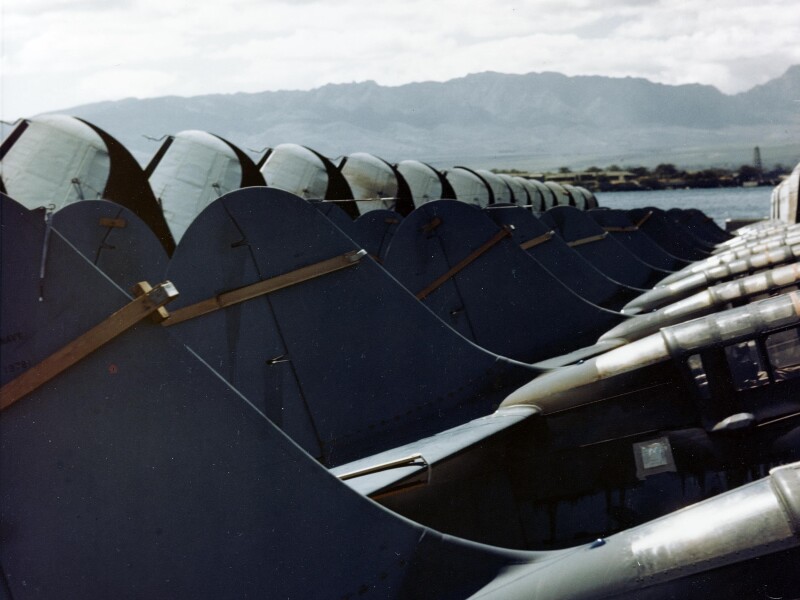
Parked at N.A.S. Ford Island, Pearl Harbor, circa 1944-45. Note use of battens to lock rudders.

Parked, probably at N.A.S. Ford Island, Pearl Harbor, circa 1944-45. Note damaged prop of plane at right, and different spinner colors

USS HORNET (CV-12) TBM and SB2C Aircraft parked on the after flight deck, 12 June 1945. USS BONNE HOMME RICHARD (CV-31) and two light carriers are in the background.
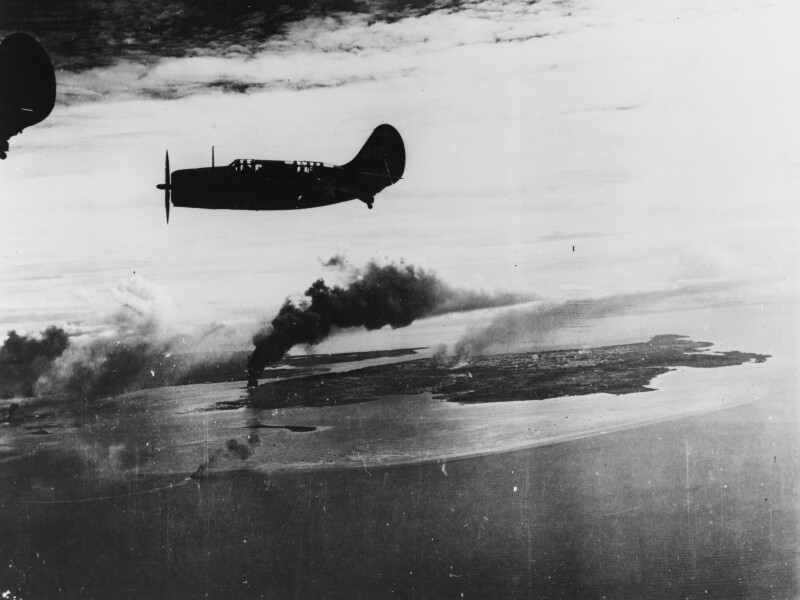
SB2C bombers from task force 38 fly past Cebu, after attacking installations and shipping there, 12 September 1944.
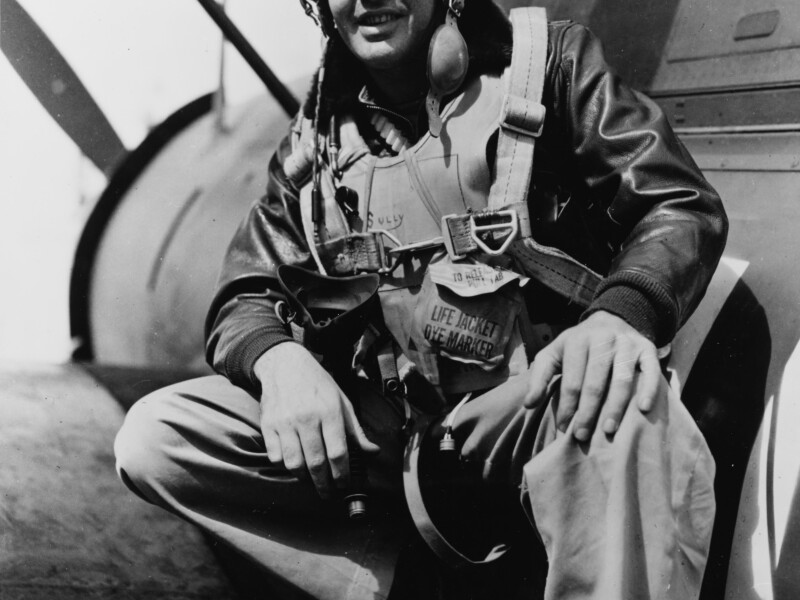
Standing on the wing of an SB2C "Helldiver", circa 1944.

TF-58 planes raid Pagan Island, 23 June 1944. Note SB2C "Helldiver" in overhead.
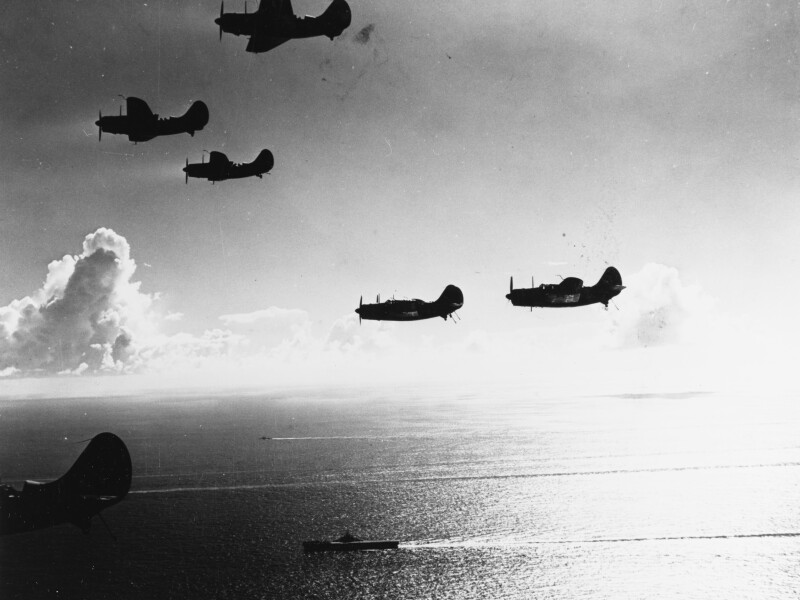
Curtiss SB2C-1 "Helldiver" bombers return to USS YORKTOWN (CV-10) after strikes on Chichi Jima. Photographed by PhoMlc O.L. Smith, USNR. Photo dated 6 July 1944, but Chichi Jima Raid was on 4 July 1944.
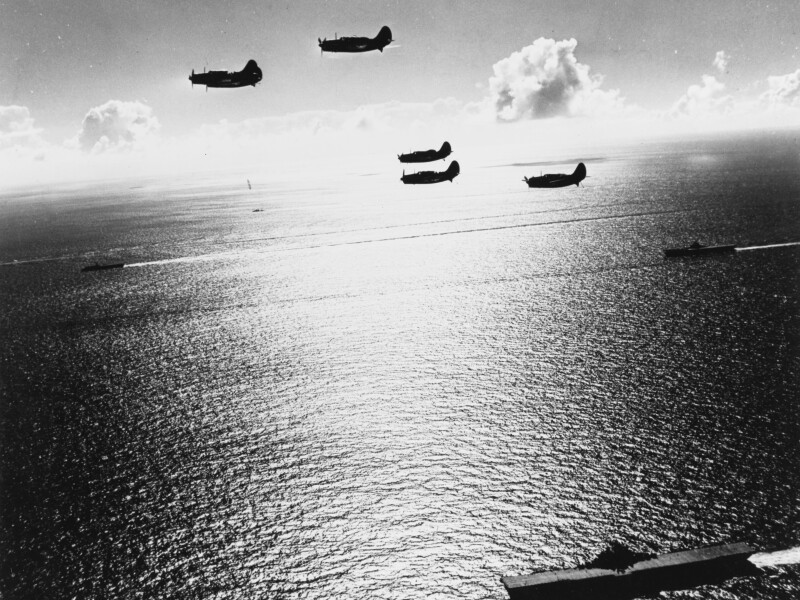
Curtiss SB2C-1 "Helldiver" bombers fly over task force 58 carriers, while returning to USS YORKTOWN (CV-10) after strikes on Chichi Jima. Photographed by PhoMlc O.L. Smith, USNR. Original CinCPac caption gives date as 6 July 1944, but Chichi Jima Raid was on 4
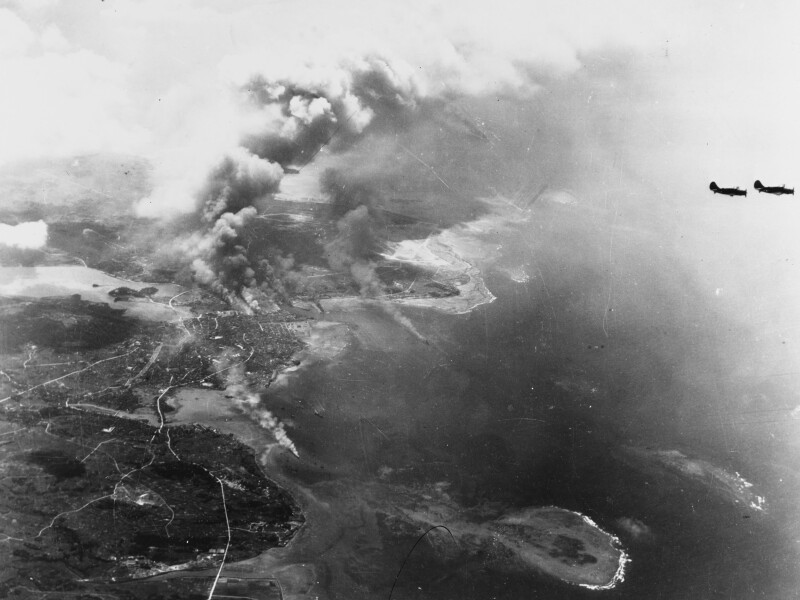
Burning harbor installations at Naha, Okinawa, 10 October 1944, during task force 38's pre-Leyte raids. Two SB2C "Helldivers" are at right.
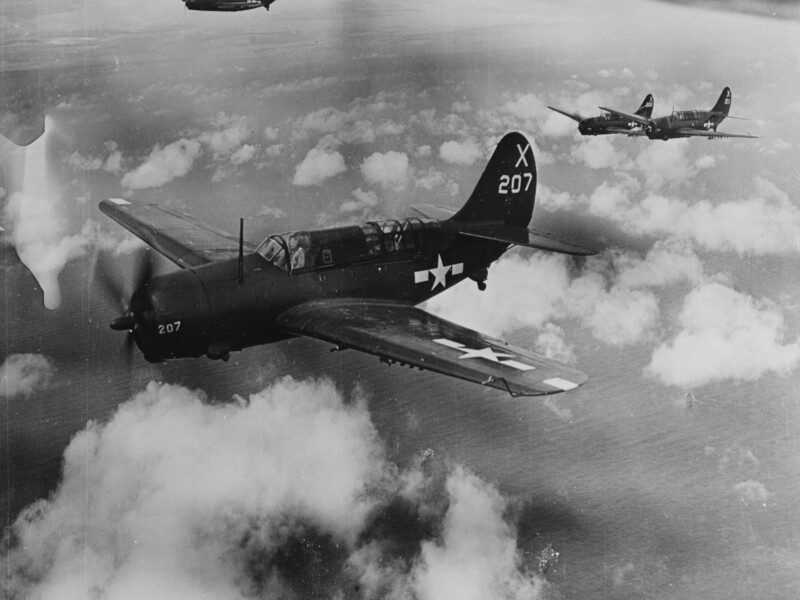
Curtiss SB2C "Helldiver" bombers from WASP take part in a mass fly-by of 981 planes from task force 38, after strikes on the Japanese, 22 March 1945.
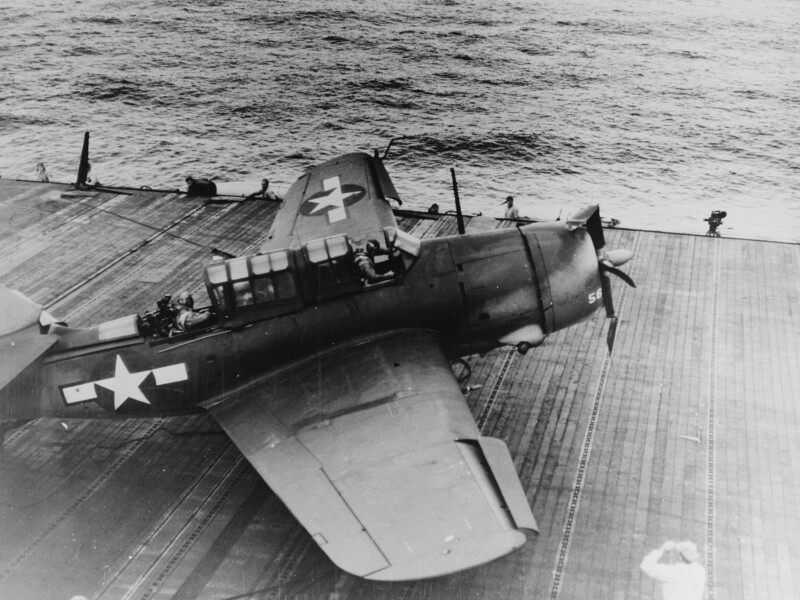
Deck crash of SB2c #56, Bu# 19530 (a SB2c-3), 11 November 1944. Pilot was R.D. Romier. Note bent propeller, extended slats and retracted rear deck on plane.
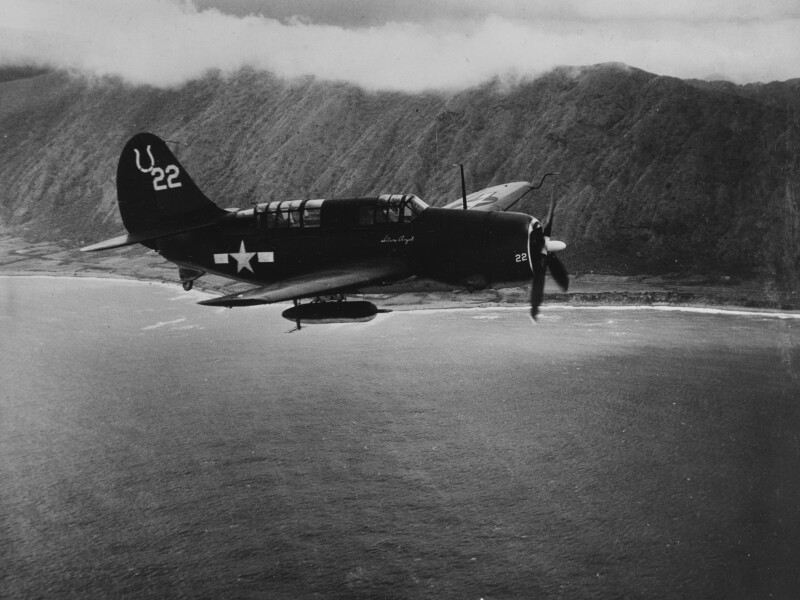
A USS HANCOCK (CV-19) SB2C-3 "Helldiver" flies below the overcast along the Eastern Coast of Formosa, en route to attack shipping at Kurin Ko, the principal North Coast Port, 13 October 1944. Note gun pod under the plane's wing, and nickname "Satan's Angel" by

Task force 38, after returning from a raid on Formosa, 13 October 1944.

Turns in formation with other Task Force 58 ships, 27 May 1944, during maneuvers prior to the Marianas operation. Note her deck load of Curtiss SB2C-1C "Helldiver" bombers and Grumman TBF " Avenger" torpedo planes. Turning astern are USS JACINTO (CVL-30) and U
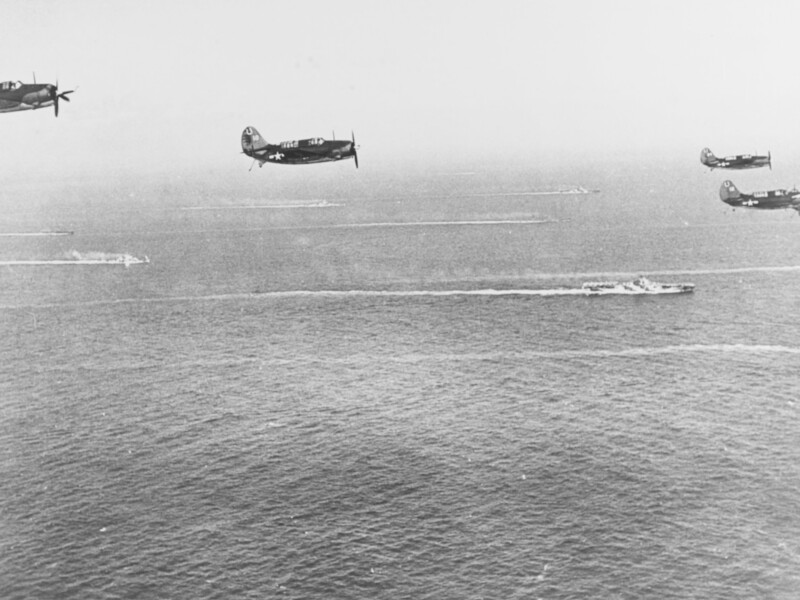
Over the fleet on their return from strikes on Manila Bay, 25 October 1944.
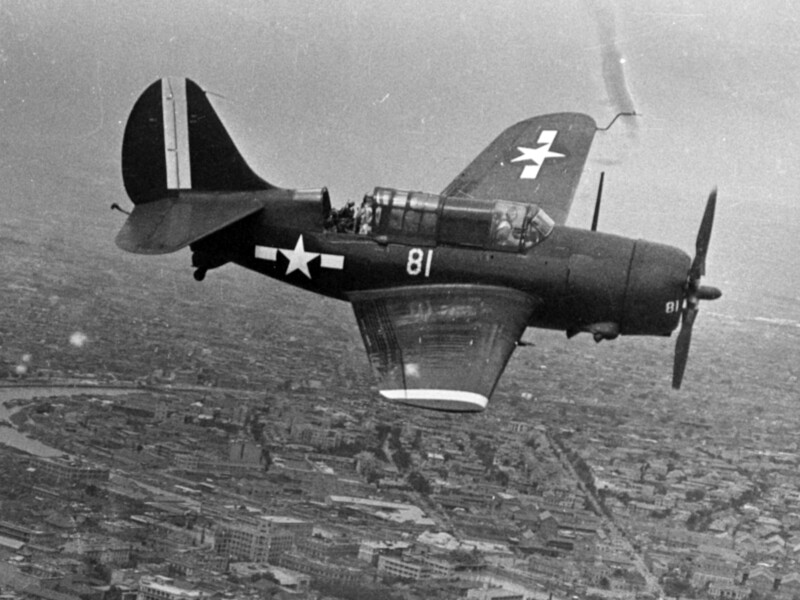
hoto #: 80-G-348290 Curtiss SB2C-5 Helldiver scout-bomber, of Bombing Squadron Ten (VB-10), USS Intrepid (CV-11) Flies over Tientsin, China, as the city is reoccupied by the Allies, 5 September 1945. Official U.S. Navy Photograph, now in the collections of the National Archives.

At sea, with an overload of aircraft on her flight deck, 14 May 1944. She is carrying at least 36 TBF, 14 F6F and 70 SB2C type planes, probably to build up fleet stocks for the Marianas Operation.
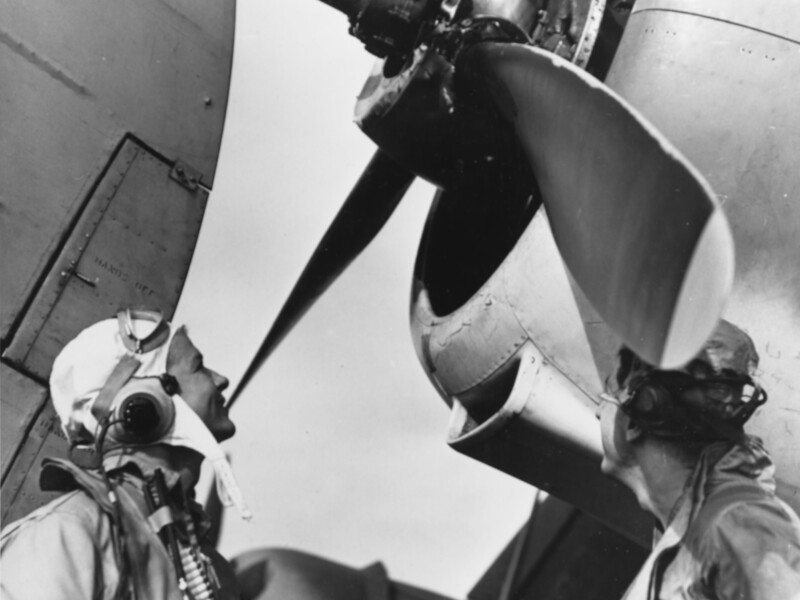
Ensign Wilfred M. Bailey and Arm3c Andrew P. Grotsis, examine the damaged propeller of their SB2C-1C "Helldiver", on board USS ESSEX (CV-9), 20 May 1944. The plane was hit by a shell during the Marcus Raid, and appears to have lost it's spinner.
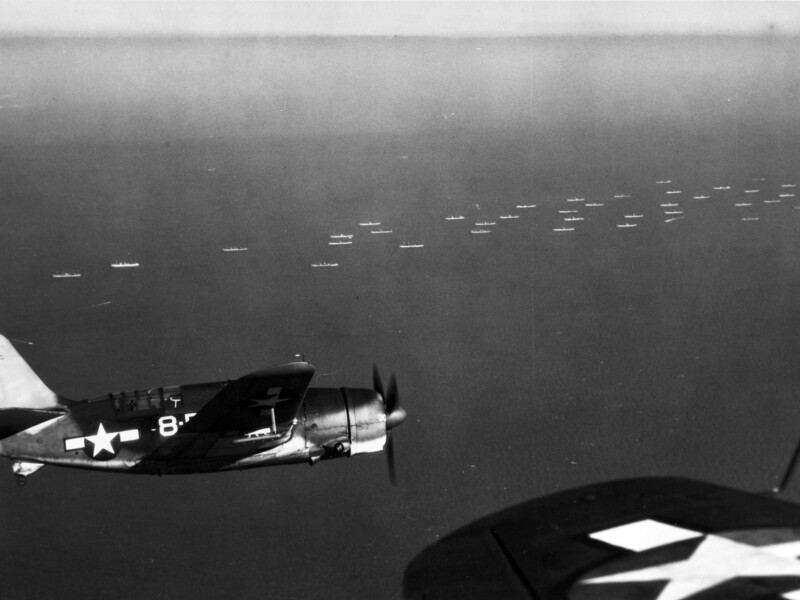
Fly near a convoy, in the Hampton Roads-Chesapeake Bay area, December 1943. Planes are from Naval Air Station Norfolk, Virginia. Photographed by Lieutenant Horace Bristol, USNR.
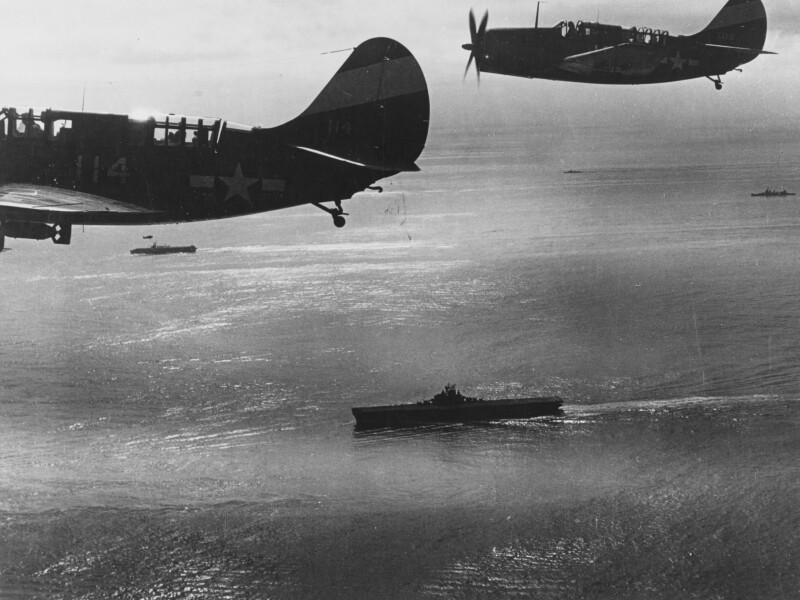
Two USS LEXINGTON (CV-16) SB2C-3 "Helldiver" bombers fly over task force 58, enroute to Tokyo for their first raid on that city, circa 16 February 1945. Ships below include an "Essex" class carrier, a "New Orleans" class cruiser and a destroyer.
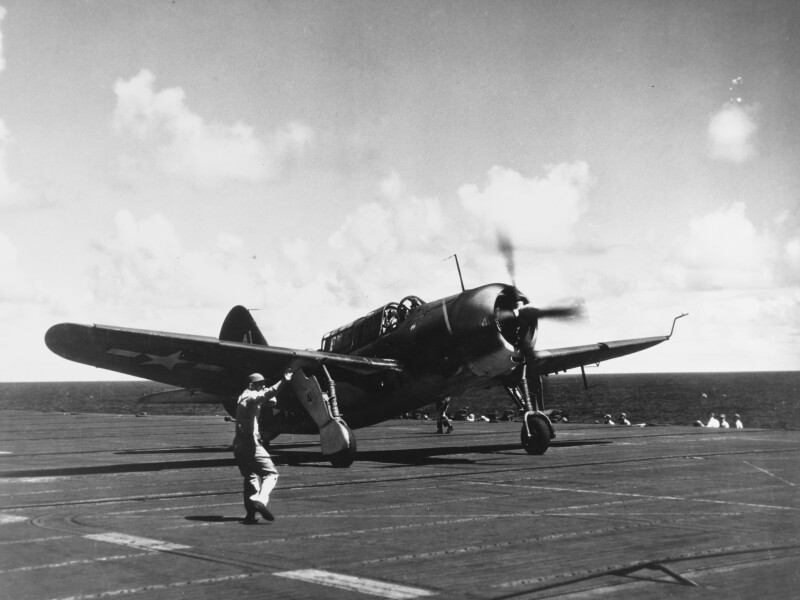
A flight deck officer signals to the pilot of a Curtiss SB2C-4 "Helldiver", instructing him to taxi up the flight deck, during training operations in the central Pacific, October 1944. Photographed by Lieutenant Commander Horace Bristol.

A Curtiss SB2C-4 "Helldiver" makes it's landing approach, as seen from the carrier's fantail. Note the carrier's wake. The plane guard destroyer at left, and effect of the SB2C's color scheme. Photographed by Lieutenant Commander Horace Bristol, during trainin
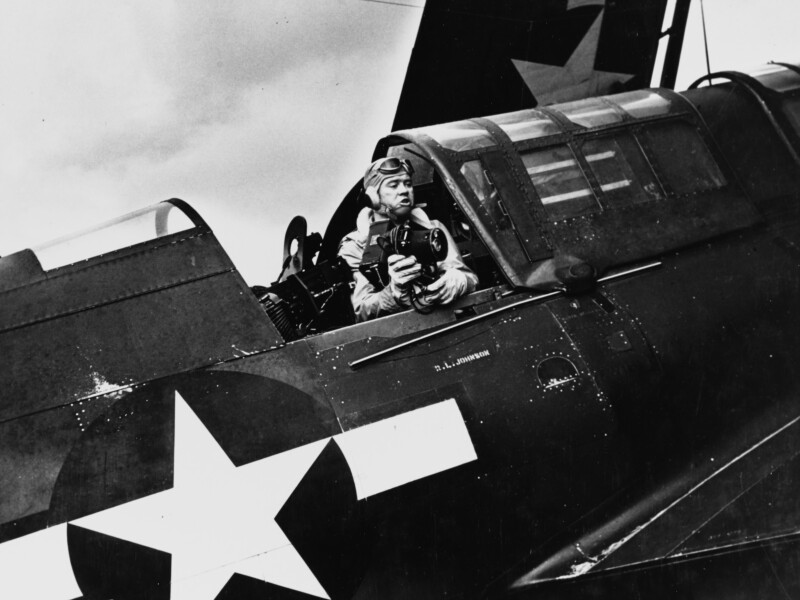
Holding a K-25 camera, in the rear seat of a Curtiss SB2C aircraft that has just landed on an aircraft carrier, January 1945. He was a member of Edward Steichen's wartime photographic unit. Note name "R.L. Johnson" stenciled on plane, and .30 caliber machine g
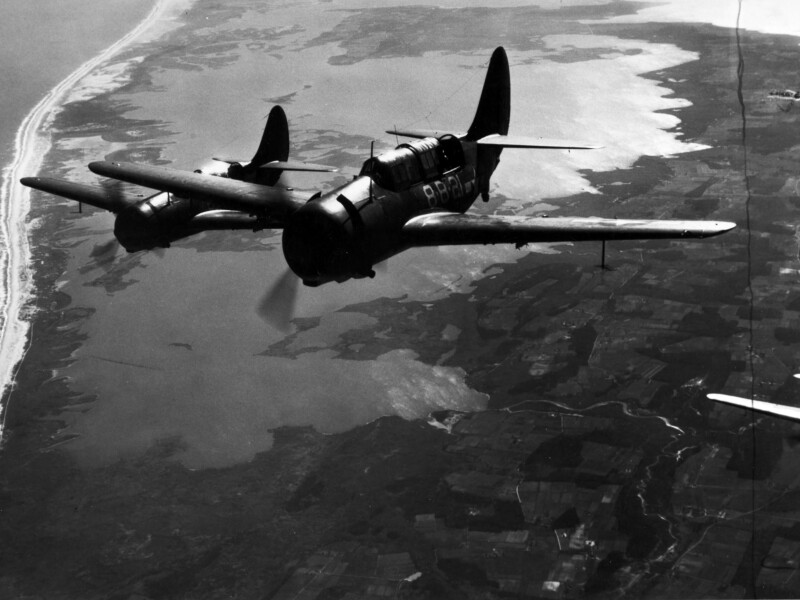
Fly in formation over the southeastern Virginia coast, December 1943. Planes are from Naval Air Station Norfolk. The North Carolina border is in the distance, and False Cape, Virginia, is at left. Photographed by Lieutenant Horace Bristol, USNR.

View showing Curtiss SB2C-1 Helldiver aircraft on deck, probably taken during the carrier qualifications of the SB2C, circa May 1943. As a result of these trials, captain J.J. Clark, USN, of the YORKTOWN recommended the dropping of the SB2C program.
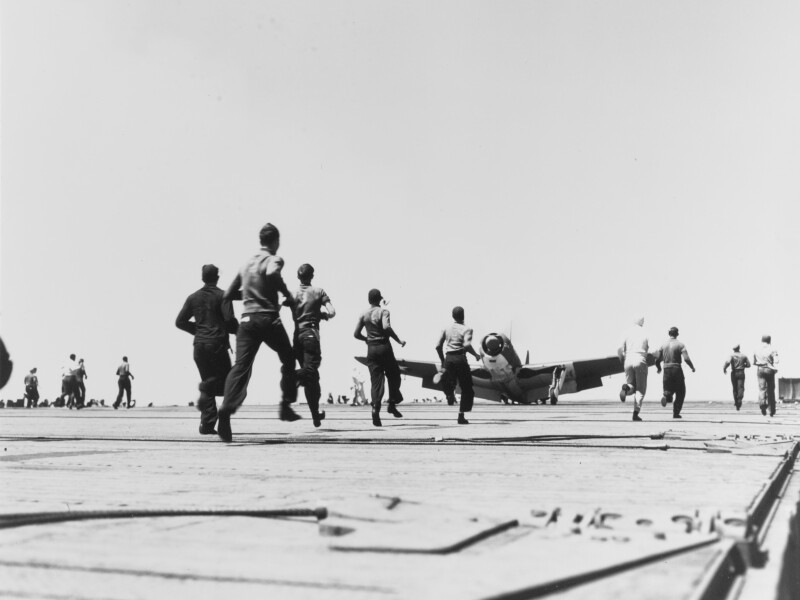
A Curtiss SB2C-1 Helldiver lands on board with a broken tail wheel, circa May 1943. The SB2C-1 Helldivers were then undergoing carrier qualification tests on the YORKTOWN. Note flight deck crewmen running to assist.
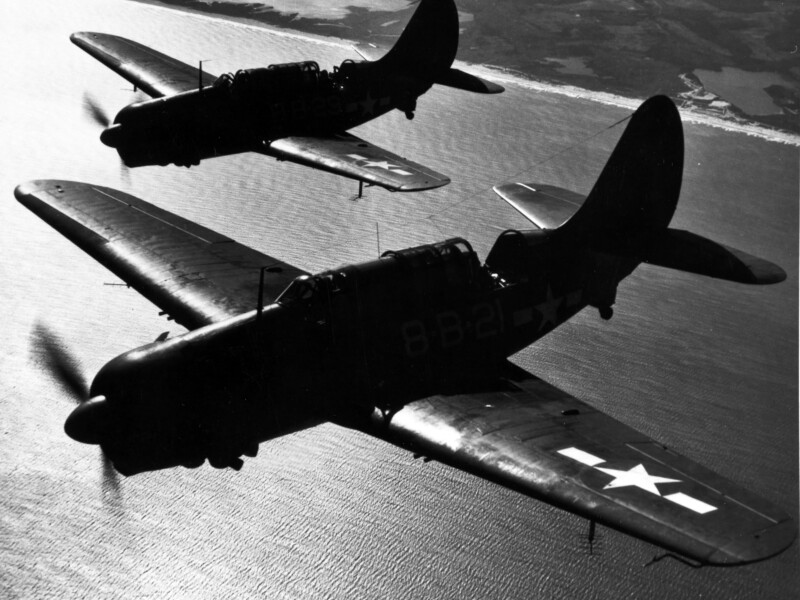
Flying in formation over the southeastern Virginia coast, December 1943. Planes are from Naval Air Station Norfolk. Photographed by Lieutenant Horace Bristol, USNR.

On a raid over Japan on 10 July 1945, with Mt. Fujiyama in the background. Plane in foreground is a TBM Avenger. Those in background are SB2C Hell Divers.
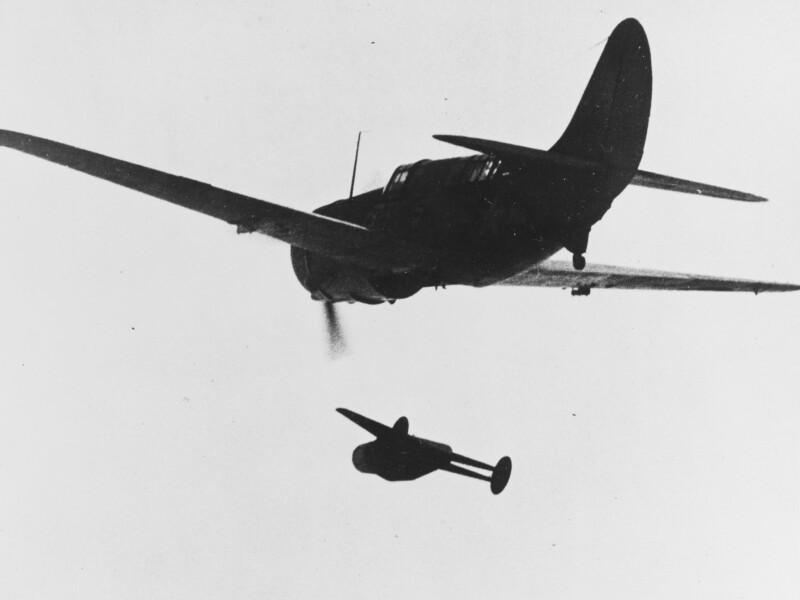
Is dropped from a Curtiss SB2C bomber, during tests. Photograph released 16 October 1946.
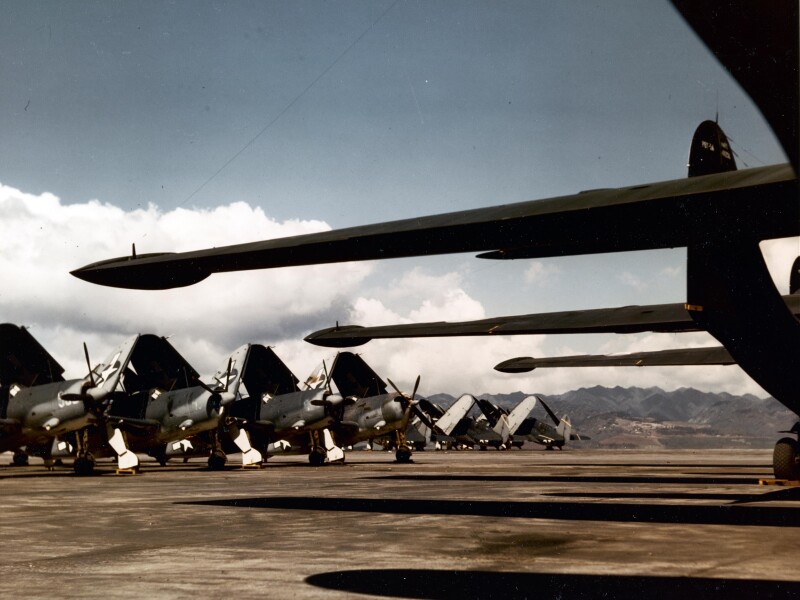
Parked on an airfield, probably at N.A.S. Ford Island, Pearl Harbor, circa 1944-45.

Photographed by Richard Shipman, a photographer from USS Intrepid (CV-11), from the back seat of an SB2C.

Plane's pilot and gunner, dressed in flight gear, pose as they prepare to go aloft, circa 1944-45.
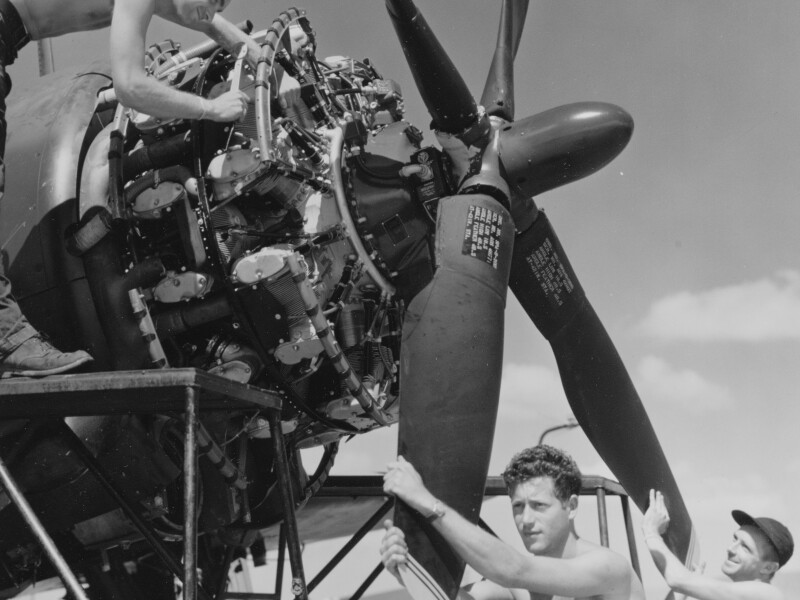
Pull through an aircraft propeller as another mechanic works on the plane's engine. Note controllable pitch propeller actuator box just behind the prop. The plane appears to be a Curtiss SB2C-4 or 5 Helldiver, in which case the engine is a Wright R-2600. Photo
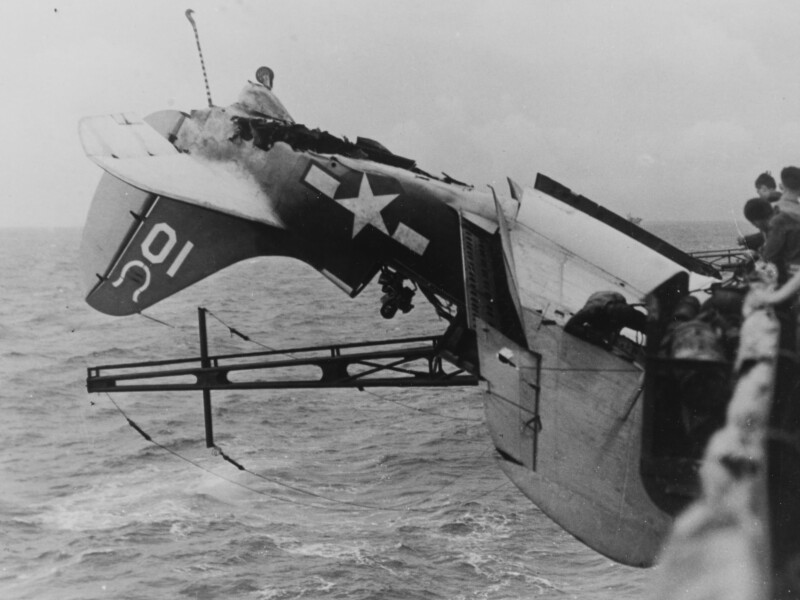
Curtiss SB2C-3 "Hell-diver" caught in the INTREPID's after radio masts after a night landing accident on 30 October 1944. Plane was from USS HANCOCK (CV-19).
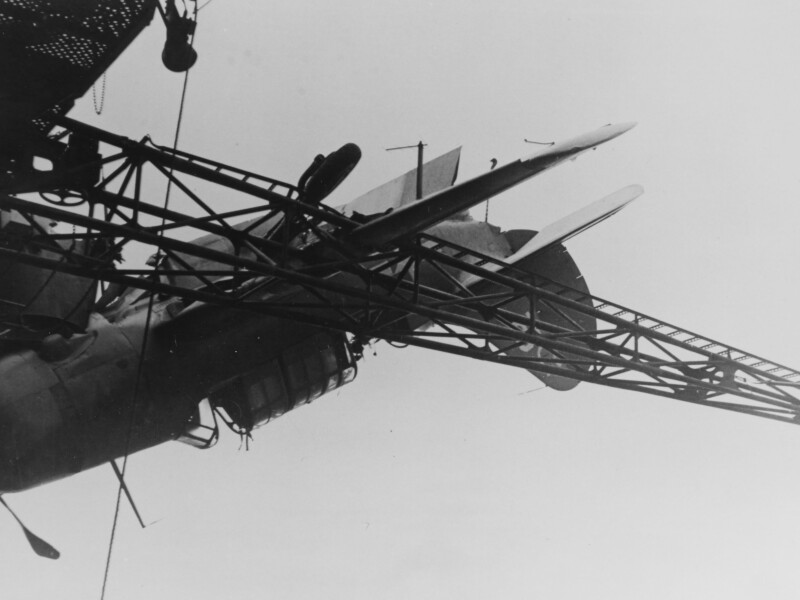
Curtiss SB2C-3 "Hell-diver" upside down in the ship's after radio masts, following a night landing accident on 30 October 1944. Plane was from USS HANCOCK (CV-19).
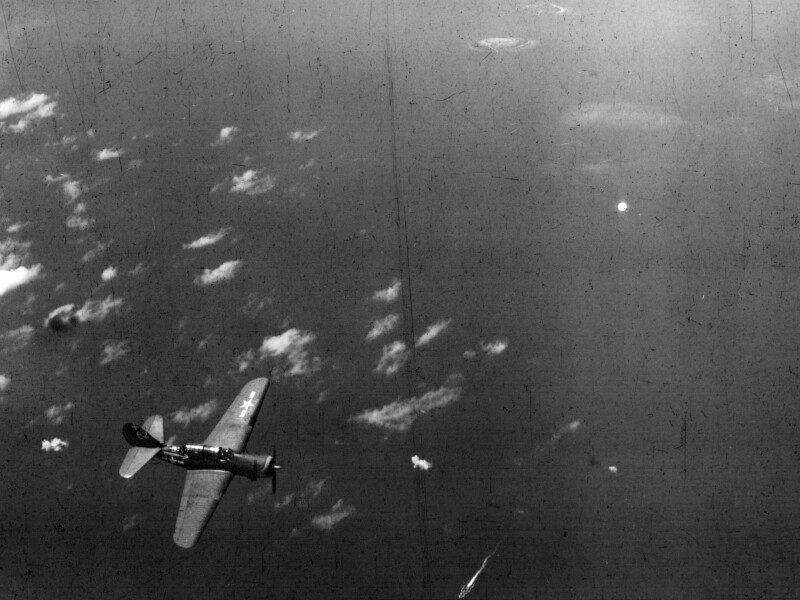
USS Intrepid (CV-11) Air Group SB2C ?Helldiver? aircraft in flight, en-route to attack the Japanese fleet. Photographed by Richard Shipman, a photographer from USS Intrepid (CV-11), from the back seat of an SB2C.
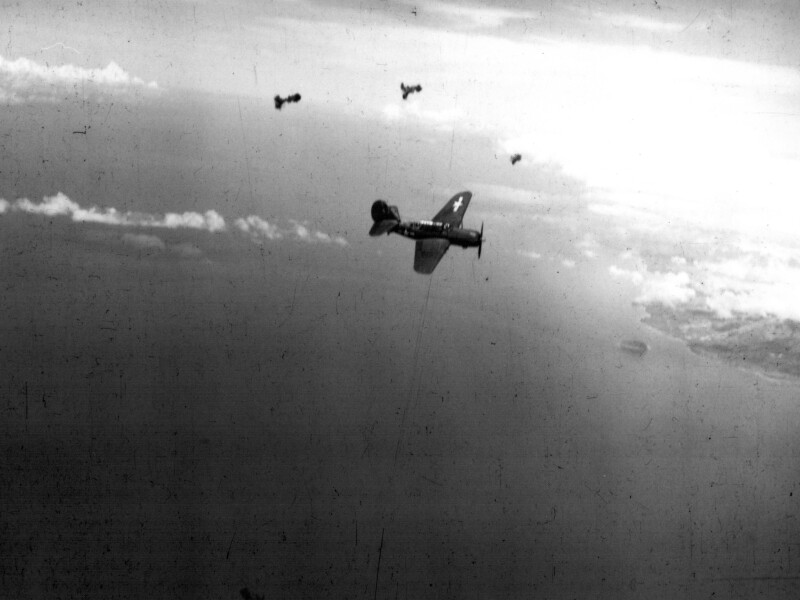
USS Intrepid (CV-11) Air Group SB2C ?Helldiver? aircraft in flight, en-route to attack the Japanese fleet. Photographed by Richard Shipman, a photographer from USS Intrepid (CV-11), from the back seat of an SB2C.
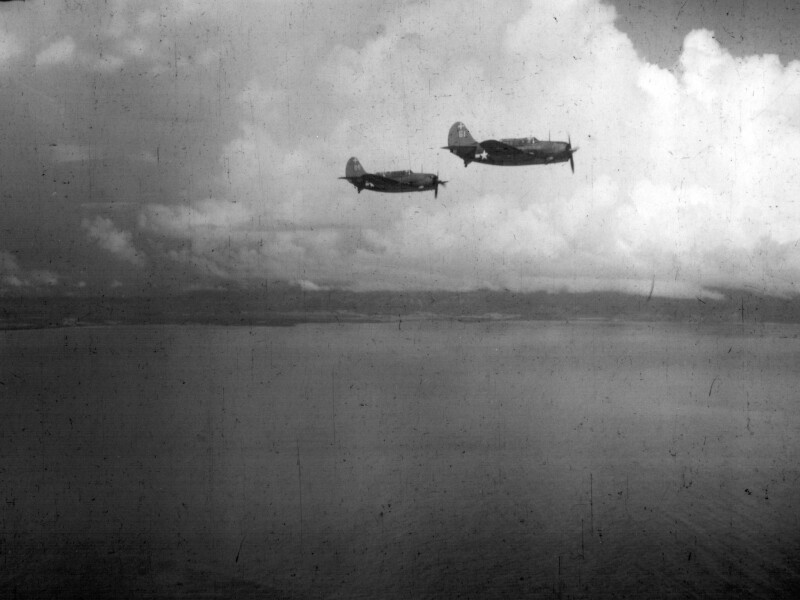
USS Intrepid (CV-11) Air Group SB2C ?Helldiver? aircraft on their return flight after the attack on the Japanese fleet. Photographed by Richard Shipman, a photographer from USS Intrepid (CV-11), from the back seat of an SB2C.
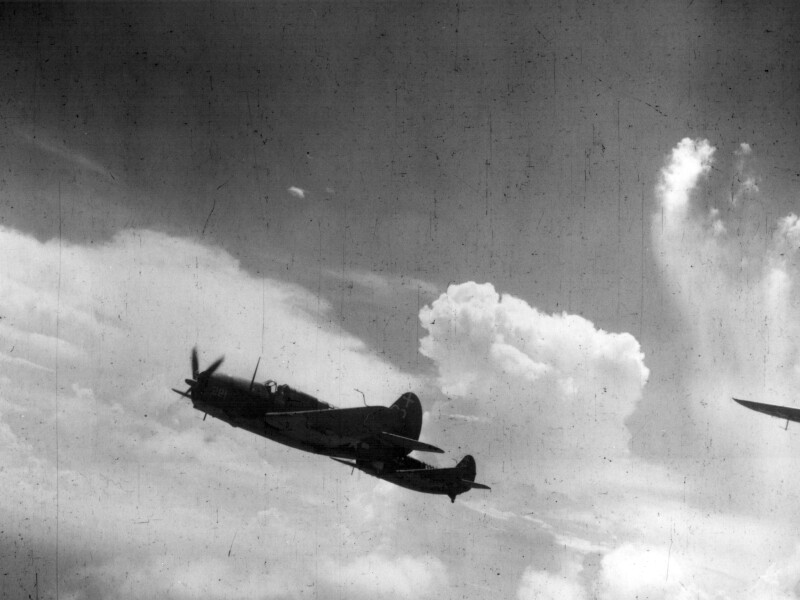
USS Intrepid (CV-11) Air Group SB2C ?Helldiver? aircraft on their return flight after the attack on the Japanese fleet. Photographed by Richard Shipman, a photographer from USS Intrepid (CV-11), from the back seat of an SB2C.
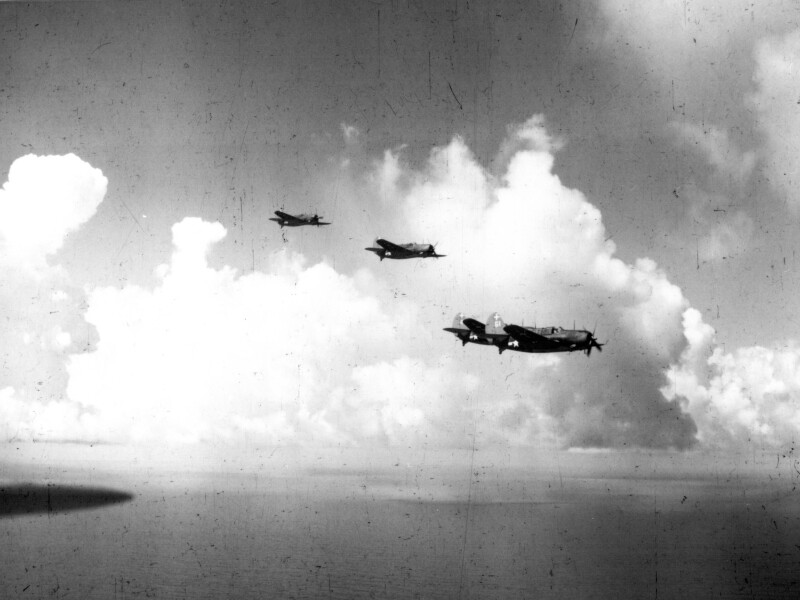
USS Intrepid (CV-11) Air Group SB2C ?Helldiver? aircraft on their return flight after the attack on the Japanese fleet. Photographed by Richard Shipman, a photographer from USS Intrepid (CV-11), from the back seat of an SB2C.

View AFT from the island, at Norfolk Naval Station, VA., circa 22 June 1943. Note ship's ensign at left, and SB2C HELLDRIVER aircraft on deck. Two old four piper destroyers are anchored off the pier

View of the starboard side of the after 5-inch/38 caliber twin gun mounts, circa May 1943. Note SB2C Helldivers on the flight deck, crewmen working on a life raft, and floater net stowage.
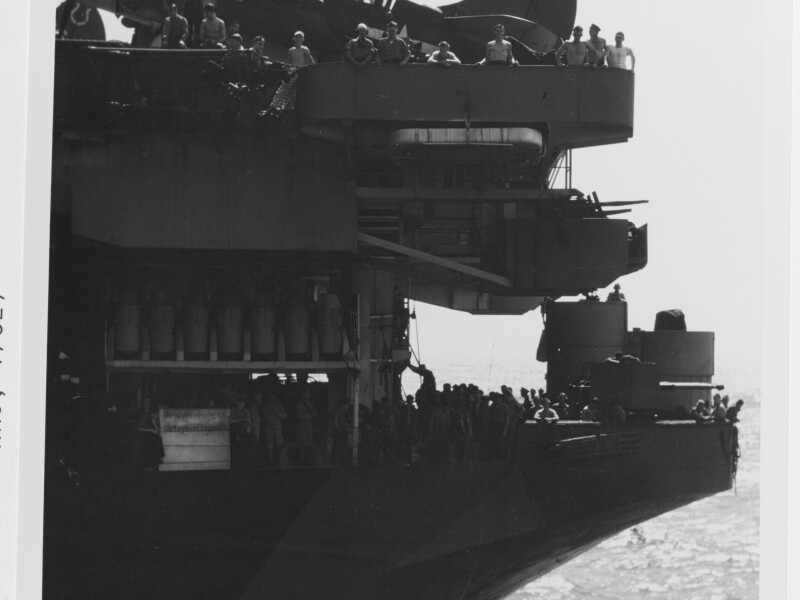
View of the ship's stern, port side, December 1944. Note SB2C Helldiver on the flight deck, wearing HANCOCK's "horseshoe" tail marking.
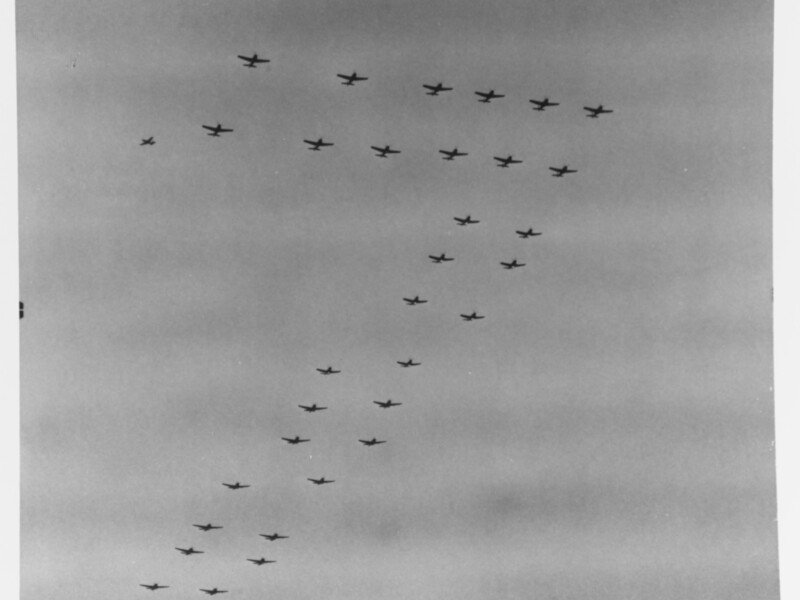
A formation of Navy carrier planes forms the numeral "7" as they fly over USS ENTERPRISE (CV-6) prior to her entrance into Pearl Harbor, 30 May 1945. The reception given to the ship by the airmen displayed the enthusiasm of men in the Pacific for backing the nation's seventh war loan drive. Photographed from the ENTERPRISE by PhoM3c James Earl Benton. Planes include TBM, F4U, F6F, SB2C types.

A group of Navy carrier planes forms the numeral "7" as they fly over USS ENTERPRISE (CV-6) prior to her entrance into Pearl Harbor, 30 May 1945. The reception given to the ship by the airmen displayed the enthusiasm of men in the Pacific for backing the nation's seventh war loan drive. Photographed from the ENTERPRISE by PhoM3c James Earl Benton. Planes include TBM, F4U, F6F, SB2C
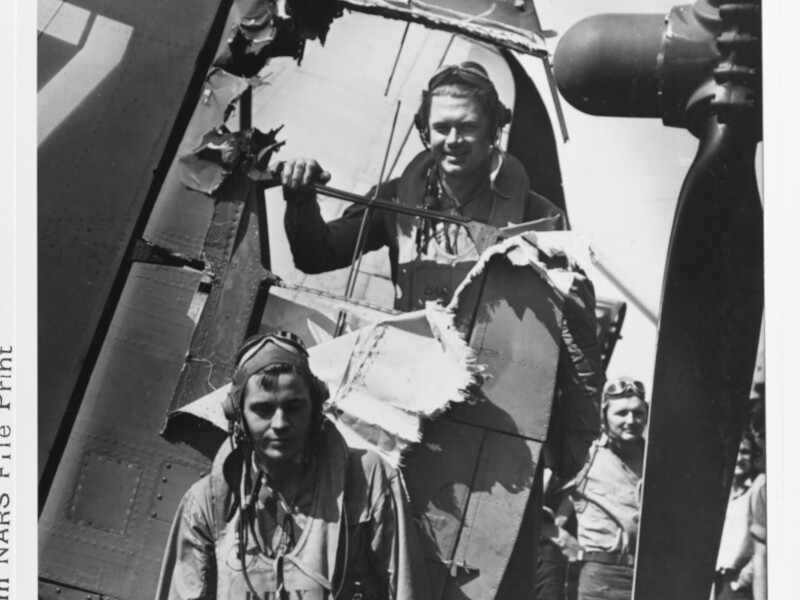
Lieutenant Junior Grade James N. Barnitz, better known as "bean bag", and arm3c Herbert N. Stienkemeyer, examine the battered rudder of the SB2C-1C (Bu# 18208) they flew in raiding Marcus Island. Photographed on board USS ESSEX (CV-9), on 20 May 1944. In the background of the picture are two of Stienkmayer's fellow gunners. To the left of the propeller is Charles Lossie Rowland, and to the right, his face partially obscured by the propeller, is Stanley Nelson Whitby. Whitby was killed five months after this photograph was taken, shot down by the Japanese over the Pescadores Islands in October of 1944.
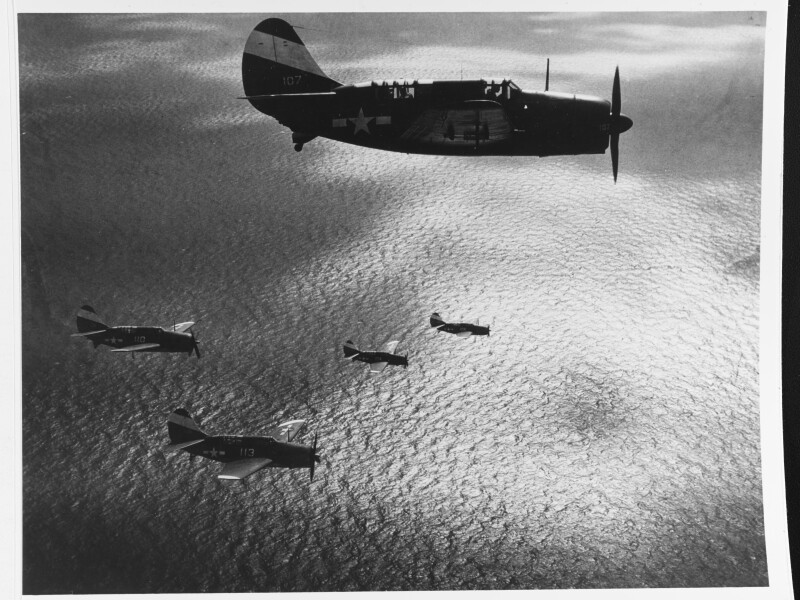
Curtiss SB2C-4 Helldiver bombers return to their carrier after a mission supporting Marines fighting on Iwo Jima, March 1945. The planes' tail markings indicate that they are from USS Lexington (CV-16). Photographed by a member of the Steichen unit. Official U.S. Navy Photograph, now in the collections of the National Archives.
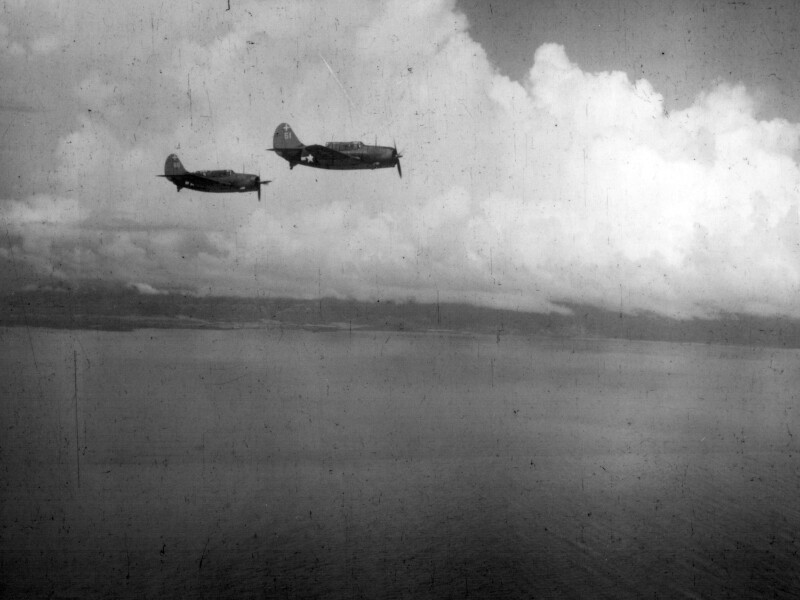
USS Intrepid (CV-11) Air Group SB2C ?Helldiver? aircraft on their return flight after the attack on the Japanese fleet. Photographed by Richard Shipman, a photographer from USS Intrepid (CV-11), from the back seat of an SB2C.
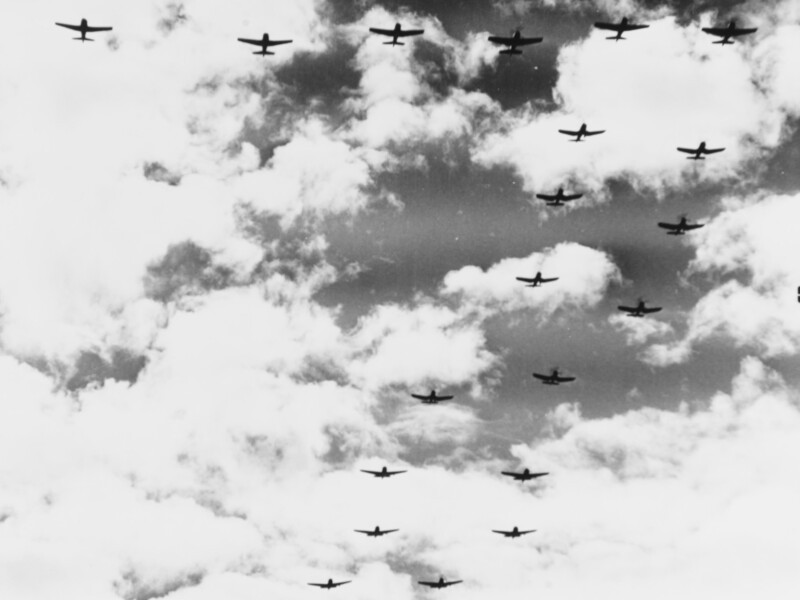
A group of Navy carrier planes forms the numeral "7" as they fly over USS ENTERPRISE (CV-6) prior to her entrance into Pearl Harbor, 30 May 1945. The reception given to the ship by the airmen displayed the enthusiasm of men in the Pacific for backing the natio

Photo #: 80-G-241043 USS Yorktown (CV-10) SB2C-1 Helldiver bombers return to the carrier after a raid in early July 1944. Photographed by Photographer's Mate First Class O.L. Smith, USNR. The original caption for this photograph, released by Commander in Chief, Pacific, gives the date as 6 July 1944 and identifies the target as Chichi Jima, Bonin Islands, which was actually attacked on 4 June. Edward Steichen's U.S. Navy War Photographs identifies the target as Guam. Official U.S. Navy Photograph, now in the collections of the National Archives.
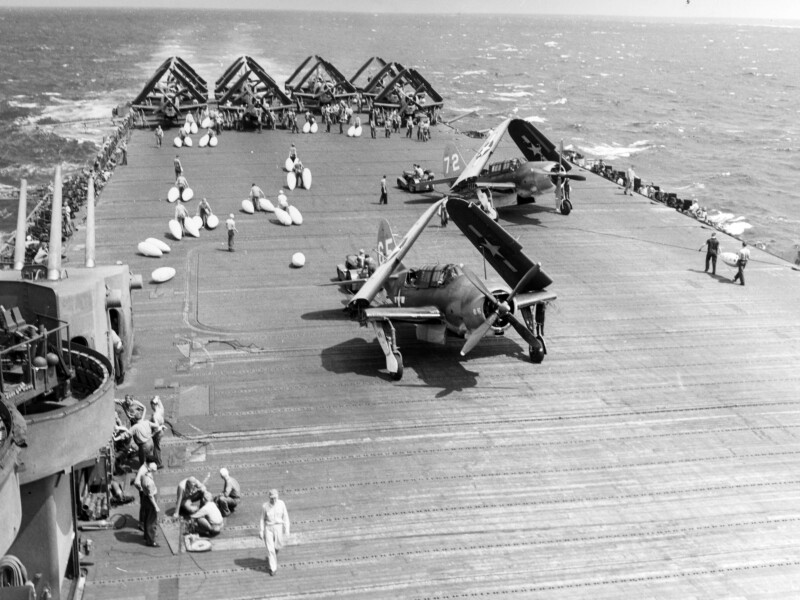
Loading drop tanks on SB2Cs aboard USS LEXINGTON (CV-16) before a search mission, on 25 October 1944.
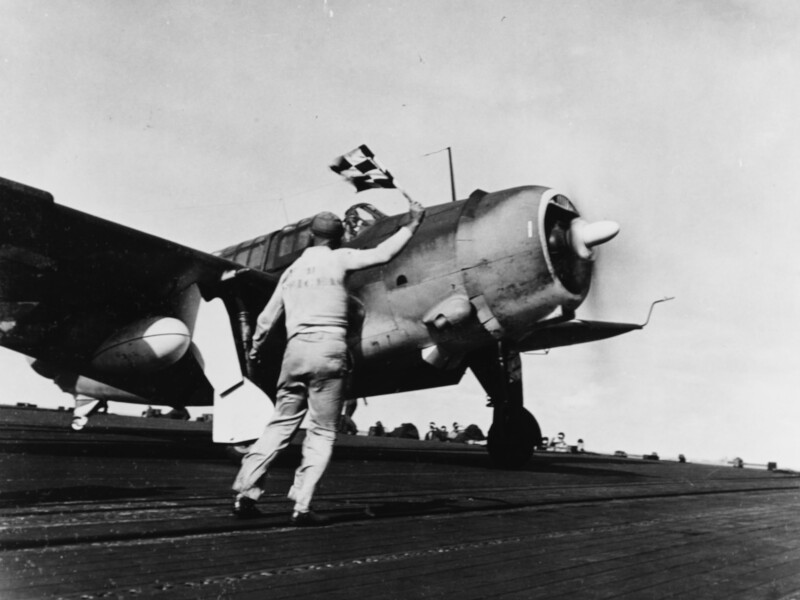
Flight Deck Officer on USS Hancock (CV-19) waves the take-off flag at a SB2C Helldiver bomber, during strikes on Manila Bay, 25 November 1944. Official U.S. Navy Photograph, now in the collections of the National Archives.
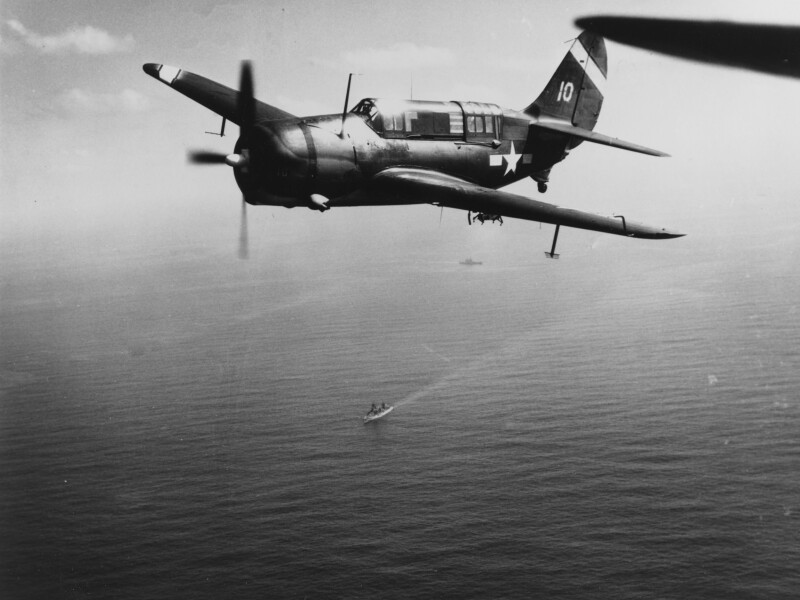
Curtiss SB2C-3 Helldiver bomber from USS Hancock (CV-19) flies over two battleships of the invasion fleet, during strikes on Iwo Jima on 19 February 1945. Official U.S. Navy Photograph, now in the collections of the National Archives.
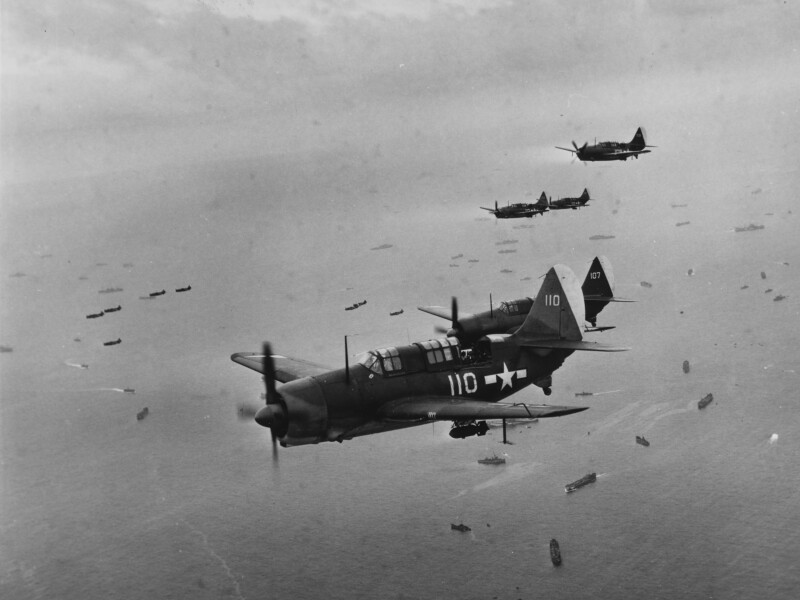
Curtiss SB2C-4 Helldiver bombers from USS Yorktown (CV-10) fly over the invasion fleet, while en route to bomb targets on Iwo Jima, 22 February 1945. Note bombs under the planes' wings. Official U.S. Navy Photograph, now in the collections of the National Arch

A formation of Navy carrier planes forms the numeral "7" as they fly over USS ENTERPRISE (CV-6) prior to her entrance into Pearl Harbor, 30 May 1945. The reception given to the ship by the airmen displayed the enthusiasm of men in the Pacific for backing the n
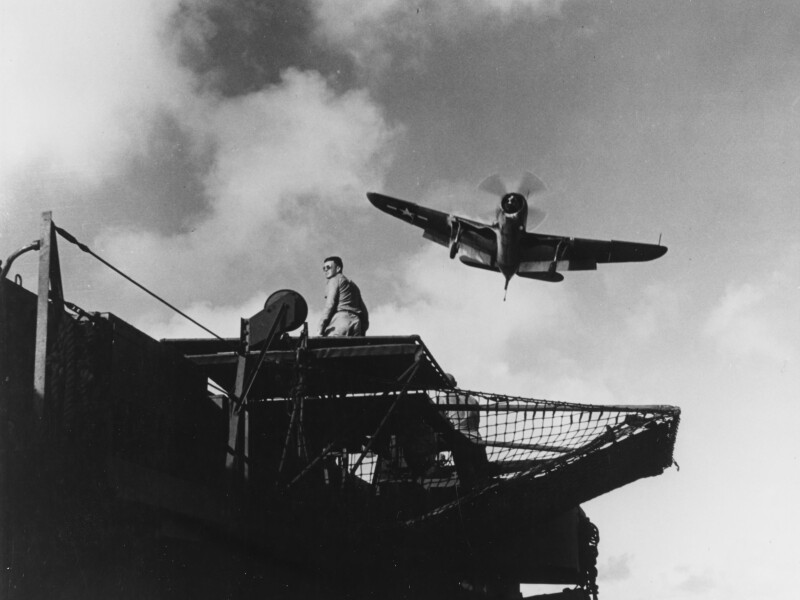
A Curtiss SB2C-3 "Hell-diver" bomber takes a "wave-off" while attempting to land in March 1945. Landing signal officer's platform is in the foreground.
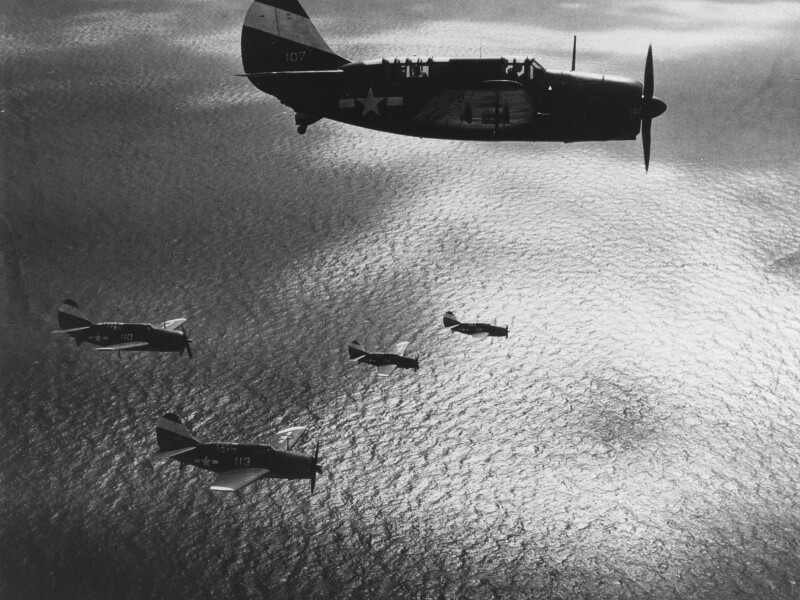
Curtiss SB2C-4 Helldiver bombers return to their carrier after a mission supporting Marines fighting on Iwo Jima, March 1945. The planes' tail markings indicate that they are from USS Lexington (CV-16). Photographed by a member of the Steichen unit. Official U
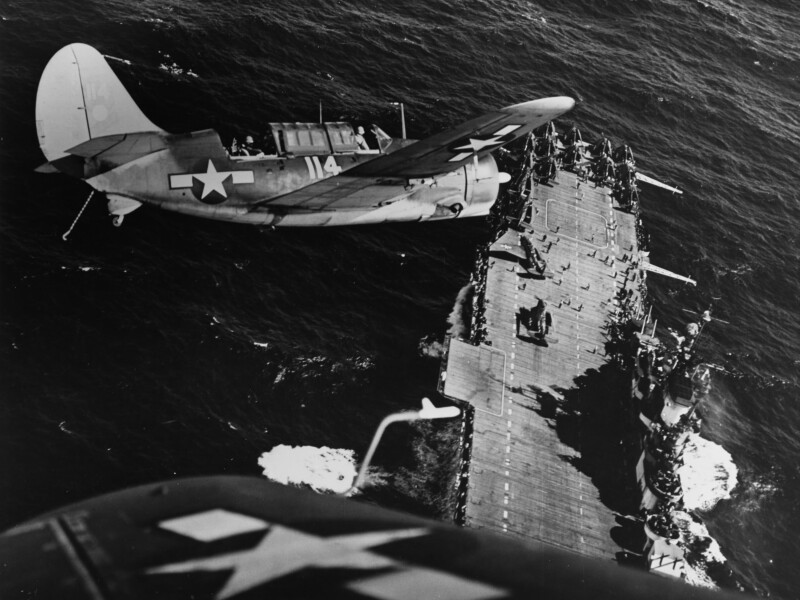
Curtiss SB2C-3 Helldiver aircraft bank over the carrier before landing, following strikes on Japanese shipping in the China Sea, circa mid-January 1945. Photographed by Lieutenant Commander Charles Kerlee, USNR. Official U.S. Navy Photograph, now in the collec
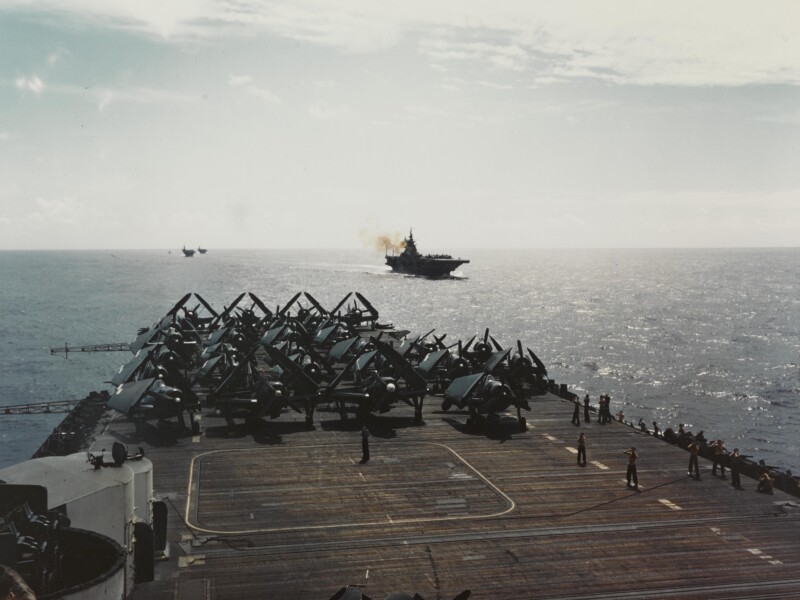
USS Hornet (CV-12) View looking aft from the ship's island as she steams with other carriers during a western Pacific gunnery practice session, circa June 1945. Next ship astern is USS Bon Homme Richard (CV-31), firing her 5/38 battery to starboard. Two small

Aircraft prepare for takeoff, on the ship's after flight deck, during operations in the Pacific in October 1943. Grumman F6F fighters are in the foreground, with TBF and SB2C aircraft beyond.
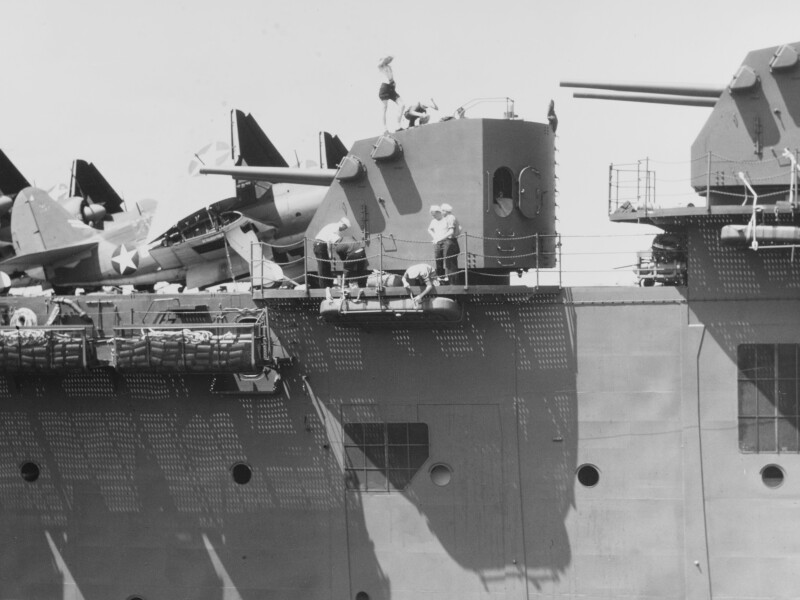
View of the starboard side of the after 5-inch/38 caliber twin gun mounts, circa May 1943. Note SB2C Helldivers on the flight deck, crewmen working on a life raft, and floater net stowage.

View of the ship's stern, port side, December 1944. Note SB2C Helldiver on the flight deck, wearing HANCOCK's "horseshoe" tail marking.
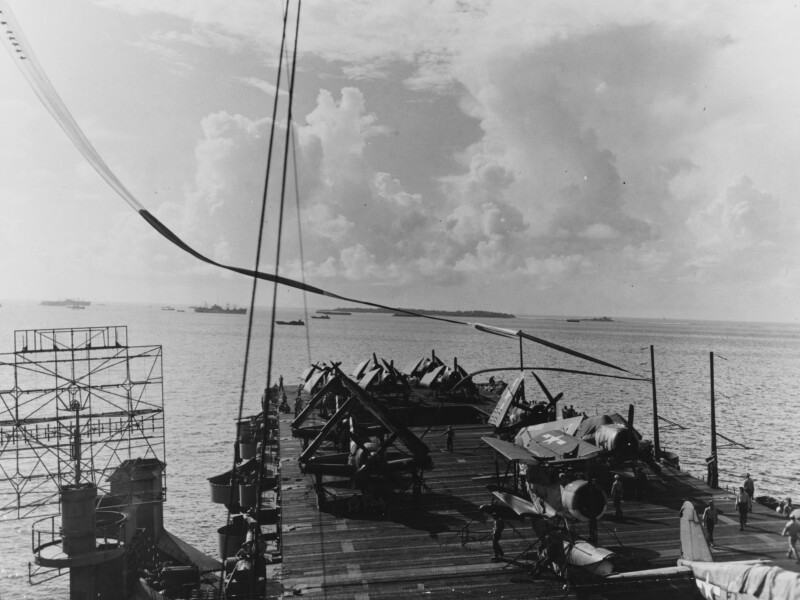
Flies a long Homeward Bound pennant as she departs the Western Pacific for overhaul in San Francisco, California, 13 April 1945. She had been operating in the combat zone since January 1944. View looks aft from the ship's island, with her SK-1 radar antennna a
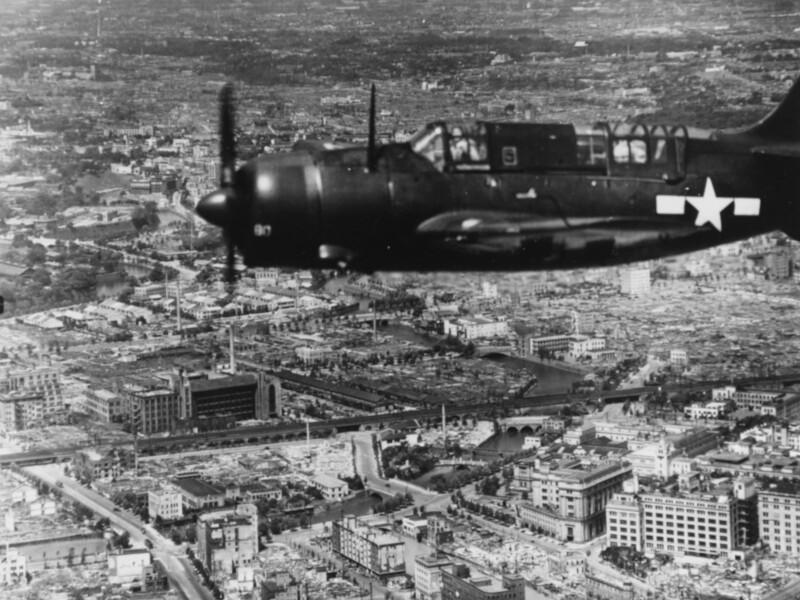
A Curtiss SB2C-4 Helldiver bomber on patrol over Tokyo, 28 August 1945. Photographed from a USS Shangri-La (CV-38) plane by Lieutenant G. D. Rogers. Note light traffic on the city streets, also burned out areas and damaged buildings. Official U.S. Navy Photogr

